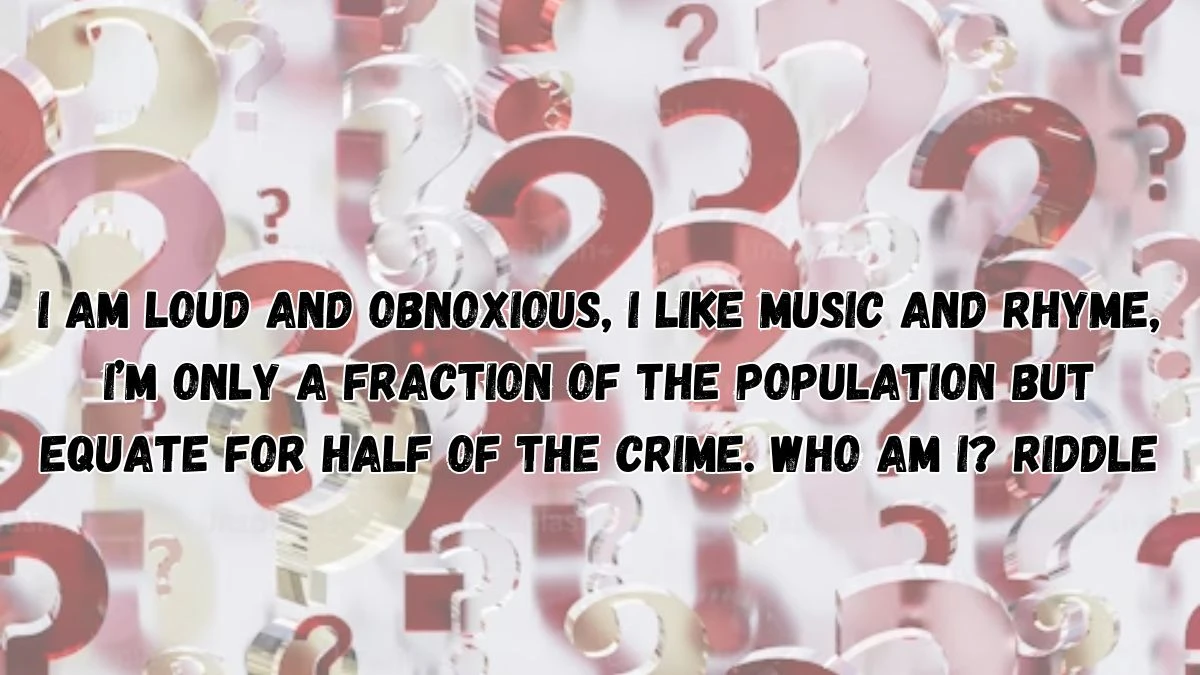- Rojgarlive »
- Riddle »
- I Am Loud And Obnoxious, I Like Music And Rhyme, I’m Only A Fraction of The Population But Equate For Half Of The Crime. Who Am I? Riddle - Answer Explained
I Am Loud And Obnoxious, I Like Music And Rhyme, I’m Only A Fraction of The Population But Equate For Half Of The Crime. Who Am I? Riddle - Answer Explained
by B Kishwar
Updated Feb 28, 2024

What is a Riddle?
A riddle is a type of puzzle or game that typically presents a question, statement, or scenario that requires creative thinking and problem-solving skills to decipher or solve. It often involves wordplay, clever language, or a play on words to conceal the answer or make it more challenging to figure out. Riddles can come in various forms, including verbal, mathematical, visual, or logical puzzles, and they have been a popular form of entertainment and mental exercise throughout history, spanning across cultures and generations. The essence of a riddle lies in its ability to engage the mind, provoke curiosity, and stimulate critical thinking as individuals attempt to unravel its hidden meaning or solution.
I Am Loud And Obnoxious, I Like Music And Rhyme, I’m Only A Fraction of The Population But Equate For Half Of The Crime. Who Am I? - Get the Riddle Answer
"I Am Loud And Obnoxious, I Like Music And Rhyme," suggests a character or entity that is characterized by being noisy and possibly disruptive, yet has an affinity for music and rhyme. This description might lead one to think of a particular type of person or group known for their outspoken nature and involvement in artistic pursuits.
"I’m Only A Fraction of The Population But Equate For Half Of The Crime," implies that despite being a minority in terms of population representation, this entity is disproportionately involved in criminal activities, possibly indicating a stereotype or common perception associated with this group.
Putting it all together, the answer to this riddle is likely "teenagers" or "young adults," particularly those associated with certain subcultures or stereotypes often depicted as rebellious, loud, and prone to delinquent behavior, such as teenagers or youth involved in street culture or gangs. This interpretation fits the clues provided, highlighting the contrast between their loud, music-loving persona and their disproportionate representation in crime statistics.
How to Solve a Riddle?
Solving a riddle involves a combination of critical thinking, creativity, and sometimes a bit of lateral thinking. Here's a step-by-step approach to cracking a riddle:
Read Carefully: Start by reading the riddle multiple times, paying close attention to every word and phrase. Look for any hints, clues, or patterns that might lead you to the answer.
Identify Key Elements: Break down the riddle into its essential components. What is the subject of the riddle? Are there any descriptive words or phrases that stand out? Is there a play on words or double meaning?
Brainstorm Solutions: Begin brainstorming possible answers based on the clues provided. Don't limit yourself to the most obvious interpretations; consider multiple possibilities and variations.
Use Logic and Reasoning: Apply logical reasoning to eliminate unlikely answers and narrow down your options. Consider how each potential answer fits with the clues and whether it makes sense in the context of the riddle.
Think Laterally: Sometimes, solving a riddle requires thinking outside the box or approaching it from a different perspective. Don't be afraid to explore unconventional interpretations or make unexpected connections between the clues.
Trial and Error: If you're unsure about the answer, try testing different possibilities to see if they fit the clues provided. Eliminate incorrect options until you arrive at the most suitable answer.
Verify Your Answer: Once you believe you've solved the riddle, double-check your answer to ensure it aligns with all the clues and provides a satisfactory solution. If it fits logically and makes sense within the context of the riddle, you've likely cracked it.
Remember, solving riddles is as much about creativity and imagination as it is about logic and reasoning. Don't be discouraged if you don't get it right away; sometimes, the most satisfying solutions come after careful contemplation and perseverance.
I Am Loud And Obnoxious, I Like Music And Rhyme, I’m Only A Fraction of The Population But Equate For Half Of The Crime. Who Am I? - Get the Riddle - FAQs
Riddles often involve wordplay, clever language, and hidden meanings that require creative thinking to decipher.
Yes, riddles can come in various forms, including verbal, mathematical, visual, and logical puzzles.
Practice reading and solving riddles regularly to sharpen your critical thinking and problem-solving abilities.
Yes, riddles are a universal form of entertainment and mental exercise, found in cultures worldwide throughout history.
Riddles engage the mind, provoke curiosity, and stimulate critical thinking, making them enjoyable challenges for people of all ages.




